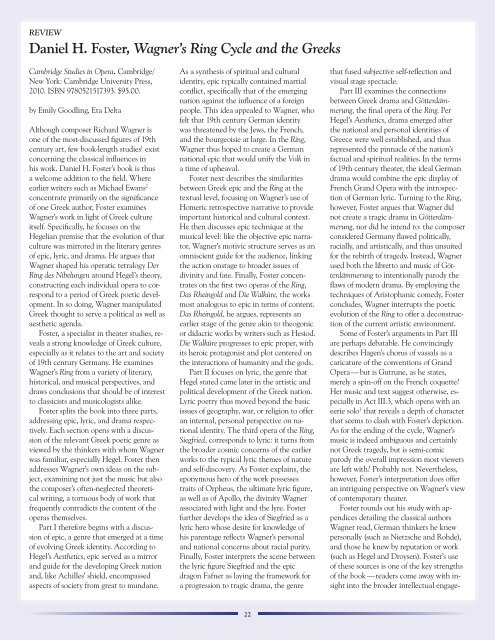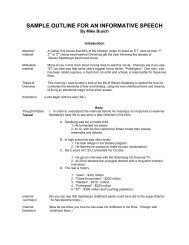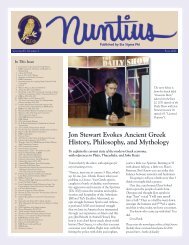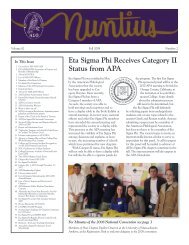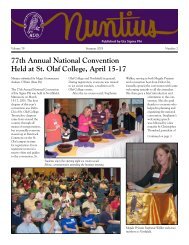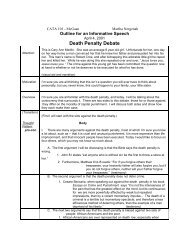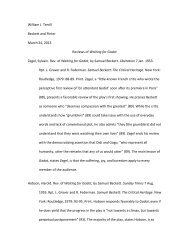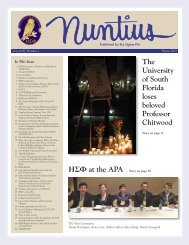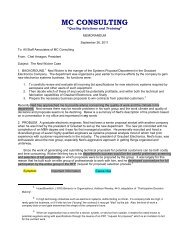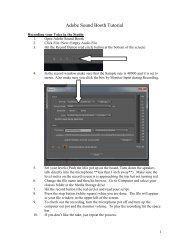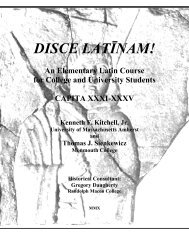In the Land of the Sibyl - Monmouth College
In the Land of the Sibyl - Monmouth College
In the Land of the Sibyl - Monmouth College
Create successful ePaper yourself
Turn your PDF publications into a flip-book with our unique Google optimized e-Paper software.
REVIEW<br />
Daniel H. Foster, Wagner’s Ring Cycle and <strong>the</strong> Greeks<br />
Cambridge Studies in Opera. Cambridge/<br />
New York: Cambridge University Press,<br />
2010. ISBN 9780521517393. $95.00.<br />
by Emily Goodling, Eta Delta<br />
Although composer Richard Wagner is<br />
one <strong>of</strong> <strong>the</strong> most-discussed figures <strong>of</strong> 19th<br />
century art, few book-length studies 1 exist<br />
concerning <strong>the</strong> classical influences in<br />
his work. Daniel H. Foster’s book is thus<br />
a welcome addition to <strong>the</strong> field. Where<br />
earlier writers such as Michael Ewans 2<br />
concentrate primarily on <strong>the</strong> significance<br />
<strong>of</strong> one Greek author, Foster examines<br />
Wagner’s work in light <strong>of</strong> Greek culture<br />
itself. Specifically, he focuses on <strong>the</strong><br />
Hegelian premise that <strong>the</strong> evolution <strong>of</strong> that<br />
culture was mirrored in <strong>the</strong> literary genres<br />
<strong>of</strong> epic, lyric, and drama. He argues that<br />
Wagner shaped his operatic tetralogy Der<br />
Ring des Nibelungen around Hegel’s <strong>the</strong>ory,<br />
constructing each individual opera to correspond<br />
to a period <strong>of</strong> Greek poetic development.<br />
<strong>In</strong> so doing, Wagner manipulated<br />
Greek thought to serve a political as well as<br />
aes<strong>the</strong>tic agenda.<br />
Foster, a specialist in <strong>the</strong>ater studies, reveals<br />
a strong knowledge <strong>of</strong> Greek culture,<br />
especially as it relates to <strong>the</strong> art and society<br />
<strong>of</strong> 19th century Germany. He examines<br />
Wagner’s Ring from a variety <strong>of</strong> literary,<br />
historical, and musical perspectives, and<br />
draws conclusions that should be <strong>of</strong> interest<br />
to classicists and musicologists alike.<br />
Foster splits <strong>the</strong> book into three parts,<br />
addressing epic, lyric, and drama respectively.<br />
Each section opens with a discussion<br />
<strong>of</strong> <strong>the</strong> relevant Greek poetic genre as<br />
viewed by <strong>the</strong> thinkers with whom Wagner<br />
was familiar, especially Hegel. Foster <strong>the</strong>n<br />
addresses Wagner’s own ideas on <strong>the</strong> subject,<br />
examining not just <strong>the</strong> music but also<br />
<strong>the</strong> composer’s <strong>of</strong>ten-neglected <strong>the</strong>oretical<br />
writing, a tortuous body <strong>of</strong> work that<br />
frequently contradicts <strong>the</strong> content <strong>of</strong> <strong>the</strong><br />
operas <strong>the</strong>mselves.<br />
Part I <strong>the</strong>refore begins with a discussion<br />
<strong>of</strong> epic, a genre that emerged at a time<br />
<strong>of</strong> evolving Greek identity. According to<br />
Hegel’s Aes<strong>the</strong>tics, epic served as a mirror<br />
and guide for <strong>the</strong> developing Greek nation<br />
and, like Achilles’ shield, encompassed<br />
aspects <strong>of</strong> society from great to mundane.<br />
As a syn<strong>the</strong>sis <strong>of</strong> spiritual and cultural<br />
identity, epic typically contained martial<br />
conflict, specifically that <strong>of</strong> <strong>the</strong> emerging<br />
nation against <strong>the</strong> influence <strong>of</strong> a foreign<br />
people. This idea appealed to Wagner, who<br />
felt that 19th century German identity<br />
was threatened by <strong>the</strong> Jews, <strong>the</strong> French,<br />
and <strong>the</strong> bourgeoisie at large. <strong>In</strong> <strong>the</strong> Ring,<br />
Wagner thus hoped to create a German<br />
national epic that would unify <strong>the</strong> Volk in<br />
a time <strong>of</strong> upheaval.<br />
Foster next describes <strong>the</strong> similarities<br />
between Greek epic and <strong>the</strong> Ring at <strong>the</strong><br />
textual level, focusing on Wagner’s use <strong>of</strong><br />
Homeric retrospective narrative to provide<br />
important historical and cultural context.<br />
He <strong>the</strong>n discusses epic technique at <strong>the</strong><br />
musical level: like <strong>the</strong> objective epic narrator,<br />
Wagner’s motivic structure serves as an<br />
omniscient guide for <strong>the</strong> audience, linking<br />
<strong>the</strong> action onstage to broader issues <strong>of</strong><br />
divinity and fate. Finally, Foster concentrates<br />
on <strong>the</strong> first two operas <strong>of</strong> <strong>the</strong> Ring,<br />
Das Rheingold and Die Walküre, <strong>the</strong> works<br />
most analogous to epic in terms <strong>of</strong> content.<br />
Das Rheingold, he argues, represents an<br />
earlier stage <strong>of</strong> <strong>the</strong> genre akin to <strong>the</strong>ogonic<br />
or didactic works by writers such as Hesiod.<br />
Die Walküre progresses to epic proper, with<br />
its heroic protagonist and plot centered on<br />
<strong>the</strong> interactions <strong>of</strong> humanity and <strong>the</strong> gods.<br />
Part II focuses on lyric, <strong>the</strong> genre that<br />
Hegel stated came later in <strong>the</strong> artistic and<br />
political development <strong>of</strong> <strong>the</strong> Greek nation.<br />
Lyric poetry thus moved beyond <strong>the</strong> basic<br />
issues <strong>of</strong> geography, war, or religion to <strong>of</strong>fer<br />
an internal, personal perspective on national<br />
identity. The third opera <strong>of</strong> <strong>the</strong> Ring,<br />
Siegfried, corresponds to lyric: it turns from<br />
<strong>the</strong> broader cosmic concerns <strong>of</strong> <strong>the</strong> earlier<br />
works to <strong>the</strong> typical lyric <strong>the</strong>mes <strong>of</strong> nature<br />
and self-discovery. As Foster explains, <strong>the</strong><br />
eponymous hero <strong>of</strong> <strong>the</strong> work possesses<br />
traits <strong>of</strong> Orpheus, <strong>the</strong> ultimate lyric figure,<br />
as well as <strong>of</strong> Apollo, <strong>the</strong> divinity Wagner<br />
associated with light and <strong>the</strong> lyre. Foster<br />
fur<strong>the</strong>r develops <strong>the</strong> idea <strong>of</strong> Siegfried as a<br />
lyric hero whose desire for knowledge <strong>of</strong><br />
his parentage reflects Wagner’s personal<br />
and national concerns about racial purity.<br />
Finally, Foster interprets <strong>the</strong> scene between<br />
<strong>the</strong> lyric figure Siegfried and <strong>the</strong> epic<br />
dragon Fafner as laying <strong>the</strong> framework for<br />
a progression to tragic drama, <strong>the</strong> genre<br />
that fused subjective self-reflection and<br />
visual stage spectacle.<br />
Part III examines <strong>the</strong> connections<br />
between Greek drama and Götterdämmerung,<br />
<strong>the</strong> final opera <strong>of</strong> <strong>the</strong> Ring. Per<br />
Hegel’s Aes<strong>the</strong>tics, drama emerged after<br />
<strong>the</strong> national and personal identities <strong>of</strong><br />
Greece were well established, and thus<br />
represented <strong>the</strong> pinnacle <strong>of</strong> <strong>the</strong> nation’s<br />
factual and spiritual realities. <strong>In</strong> <strong>the</strong> terms<br />
<strong>of</strong> 19th century <strong>the</strong>ater, <strong>the</strong> ideal German<br />
drama would combine <strong>the</strong> epic display <strong>of</strong><br />
French Grand Opera with <strong>the</strong> introspection<br />
<strong>of</strong> German lyric. Turning to <strong>the</strong> Ring,<br />
however, Foster argues that Wagner did<br />
not create a tragic drama in Götterdämmerung,<br />
nor did he intend to: <strong>the</strong> composer<br />
considered Germany flawed politically,<br />
racially, and artistically, and thus unsuited<br />
for <strong>the</strong> rebirth <strong>of</strong> tragedy. <strong>In</strong>stead, Wagner<br />
used both <strong>the</strong> libretto and music <strong>of</strong> Götterdämmerung<br />
to intentionally parody <strong>the</strong><br />
flaws <strong>of</strong> modern drama. By employing <strong>the</strong><br />
techniques <strong>of</strong> Aristophanic comedy, Foster<br />
concludes, Wagner interrupts <strong>the</strong> poetic<br />
evolution <strong>of</strong> <strong>the</strong> Ring to <strong>of</strong>fer a deconstruction<br />
<strong>of</strong> <strong>the</strong> current artistic environment.<br />
Some <strong>of</strong> Foster’s arguments in Part III<br />
are perhaps debatable. He convincingly<br />
describes Hagen’s chorus <strong>of</strong> vassals as a<br />
caricature <strong>of</strong> <strong>the</strong> conventions <strong>of</strong> Grand<br />
Opera — but is Gutrune, as he states,<br />
merely a spin-<strong>of</strong>f on <strong>the</strong> French coquette<br />
Her music and text suggest o<strong>the</strong>rwise, especially<br />
in Act III.3, which opens with an<br />
eerie solo 3 that reveals a depth <strong>of</strong> character<br />
that seems to clash with Foster’s depiction.<br />
As for <strong>the</strong> ending <strong>of</strong> <strong>the</strong> cycle, Wagner’s<br />
music is indeed ambiguous and certainly<br />
not Greek tragedy, but is semi-comic<br />
parody <strong>the</strong> overall impression most viewers<br />
are left with Probably not. Never<strong>the</strong>less,<br />
however, Foster’s interpretation does <strong>of</strong>fer<br />
an intriguing perspective on Wagner’s view<br />
<strong>of</strong> contemporary <strong>the</strong>ater.<br />
Foster rounds out his study with appendices<br />
detailing <strong>the</strong> classical authors<br />
Wagner read, German thinkers he knew<br />
personally (such as Nietzsche and Rohde),<br />
and those he knew by reputation or work<br />
(such as Hegel and Droysen). Foster’s use<br />
<strong>of</strong> <strong>the</strong>se sources is one <strong>of</strong> <strong>the</strong> key strengths<br />
<strong>of</strong> <strong>the</strong> book — readers come away with insight<br />
into <strong>the</strong> broader intellectual engage-<br />
22


